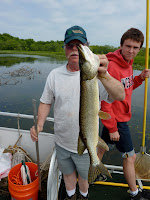On Thursday, Chernoff, and a crew consisting of Wesleyan students and associates, set off from the Portland boatyards in a Wesleyan pontoon boat for what will be a monthly census of the fish life in the Mattabesset and Coginchaug Rivers, at a site where they flow together before they enter the Connecticut.
Chernoff has been survey fish populations in five spots on the Cogninchaug and Mattabassett for seven years, and he's amazed at the diversity of the population in what he calls an extremely important estuary for fish life in Connecticut.
Chernoff says that half of the fresh water species known to exist in Connecticut can be found in these rivers, along with several species which travel from the ocean, and upriver to spawn.
To survey the fish, Chernoff places a electrode in the water which delivers a mild shock to the fish, causing them to be stunned temporarily so that they surface and can be counted or netted. Chernoff has the permission of the State Department of Environmental protection to administer the shock which he notes has been 99% effective in returning live and healthy fish back to the river after they've been counted.
Before they begin counting fish, Chernoff and the crew test water chemistry, depth and temperature.
 On Thursday's census, Chernoff and his crew discovered nearly twenty species of fish in a large variety of sizes, from the tiny male stickleback, a tiny black fish with a bright red fin used to attract the female of the species, to a northern pike which measured nearly three feet. The most surprising sighting were three bowfish (called chopique by cooks in Louisiana), an ancient species which turns emerald green during mating season.
On Thursday's census, Chernoff and his crew discovered nearly twenty species of fish in a large variety of sizes, from the tiny male stickleback, a tiny black fish with a bright red fin used to attract the female of the species, to a northern pike which measured nearly three feet. The most surprising sighting were three bowfish (called chopique by cooks in Louisiana), an ancient species which turns emerald green during mating season. Chernoff noted that the native pumpkin seed was a fish so colorful that it would not be out of place swimming on a tropical coral reef. Other fish surveyed were black croppy, chain pickeral, darters, black bullhead, red fin pickeral, blue gill, banded killifish, common suckers, spot tail shiner, yellow perch, mud minnows and hundreds of American eels.
Chernoff noted that the native pumpkin seed was a fish so colorful that it would not be out of place swimming on a tropical coral reef. Other fish surveyed were black croppy, chain pickeral, darters, black bullhead, red fin pickeral, blue gill, banded killifish, common suckers, spot tail shiner, yellow perch, mud minnows and hundreds of American eels.
Chernoff says this information is essential to collect to determine the ongoing health of what is an important, and protected refuge for bird, fish and wildlife.
Barry Chernoff will appear on Eye on the Air, Friday, on WESU, 88.1 FM (wwuh.org) from 1-1:30 PM.





1 comment:
I'm reading this on Sunday, May 30. Did your radio interview with Chernoff occur on Friday, May 28, or will it occur on Friday, June 4? I don't see it in the archives. If it already occurred, I hope it makes it into the archives. If it didn't, I look forward to listening.
Post a Comment